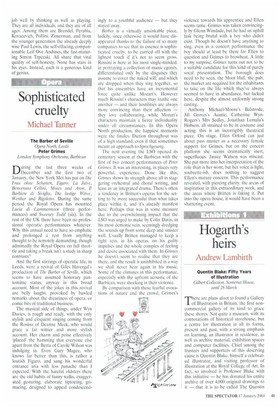Sophisticated cruelty
Michael Tanner
The Barber of Seville Opera North, Leeds Peter Grimes London Symphony Orchestra, Barbican
During the last three weeks of L./December and the first two of January, the New York Met has put on Die Frau ohne Sehatten, Figaro, La hive, Benvenuto Cellini, Moses urzd Aron. II Barb/ere di Siviglia, Die lustige Witwe, Werther and Rigoletto. During the same period the Royal Opera has mounted Lucia di Lammermoor (three performances) and Sweeney Todd (six). In the rest of the UK there have been no professional operatic performances whatever. Why this annual need to have so emphatic and prolonged a rest from anything thought to be remotely demanding, though admittedly the Royal Opera on full throttle and taking a break isn't a study in sharp contrasts?
And the first stirrings of operatic life, in Leeds, were a revival of Giles Havergal's production of The Barber of Seville, which seems to have assumed honorary pantomime status, anyway in this broad account. Most of the jokes in this revival are belly laughs, provoked by bawled remarks about the dreariness of opera, or comic bits of traditional business.
The musical side of things, under Wyn Davies, is rough and ready, with the only stylish and eloquent singing coming from the Rosina of Deanne Meek, who would grace a far wittier and more stylish account. Her charm and poise effectively 'placed' the hamming that everyone else apart from the Berta of Carole Wilson was indulging in. Even Gary Magee, who knows far better than this, is rather a loutish Figaro, and sang his wonderful entrance aria with less panache than I expected. With the hateful oldsters there are the old habits of funny walks, exaggerated gesturing, elaborate tiptoeing, grimacing, designed to appeal condescend
ingly to a youthful audience — but they stayed away.
Barber is a virtually unsinkable piece, luckily, since otherwise it would have disappeared thanks to the failure of so many companies to see that its essence is sophisticated cruelty, to be carried off with the lightest touch if it's not to seem gross. Rossini is here at his most single-minded, in portraying a collection of manic egoists, differentiated only by the disguises they assume to cover the naked will; and which are dropped when they sing together, so that his ensembles have an incremental force quite unlike Mozart's. However much Rossini's characters may loathe one another — and their hostilities are always more convincing than their affection — they love collaborating, while Mozart's characters maintain a fierce individuality under all circumstances. In this Opera North production, the happiest moments were the finales. Diction throughout was of a high standard, even if that sometimes meant an approach to Sprechgesang.
The next evening the LSO opened its centenary season at the Barbican with the first of two concert performances of Peter Grimes. It was an interesting, in places very powerful, experience. Done like this, Grimes shows its strength above all in staggering orchestral and choral writing, and least as an integrated drama. There's often a tendency in Britten's operas for the setting to be more successful than what takes place within it, and it's already manifest here. Perhaps that was in some measure due to the overwhelming impact that the LSO was urged to make by Colin Davis, in his most demonic vein, seemingly dredging the sounds up from some deep and sinister well. Usually Britten managed to keep a tight rein, in his operas, on his guilty impulses and the whole complex of feeling and desire associated with them. In Grimes he doesn't seem to realise that they are there, and the result is uninhibited in a way we shall never hear again in his music. Some of the climaxes in this performance, especially with the upfront acoustic of the Barbican, were shocking in their violence.
By comparison with these fearful evocations of nature and the crowd, Grimes's violence towards his apprentice and Ellen seems tame. Grimes was taken convincingly by Glenn Winslade, but he had an uphill task being brutal with a boy who didn't exist. Though he doesn't have anything to sing, even in a concert performance the boy should at least be there for Ellen to question and Grimes to browbeat. A little to my surprise, Grimes turns out not to be a suitable candidate for this kind of purely vocal presentation. The borough does need to be seen, the Moot Hall, the pub, the market are required for the inhabitants to take on the life which they've always seemed to have in abundance, but lacked here, despite the almost uniformly strong casting.
Anthony Michael-Moore's Balstrode, Jill Groves's Auntie, Catherine WynRogers's Mrs Sedley, Jonathan Lemalu's Hobson, all strained to be in costume and acting: this is an incorrigibly theatrical piece. On stage, Ellen Orford can just about pass muster as a necessary female support for Grimes, but on the concert platform she seems dramatically inert, superfluous. Janice Watson was miscast. She put more into her interpretation of the role than is her wont, but her voice is light, soubrette-ish, does nothing to suggest Ellen's mature concern. This performance revealed, with piercing clarity, the areas of inspiration in this extraordinary work, and the areas where Britten is faking it. Put into the opera house, it would have been a shattering event.


































































 Previous page
Previous page